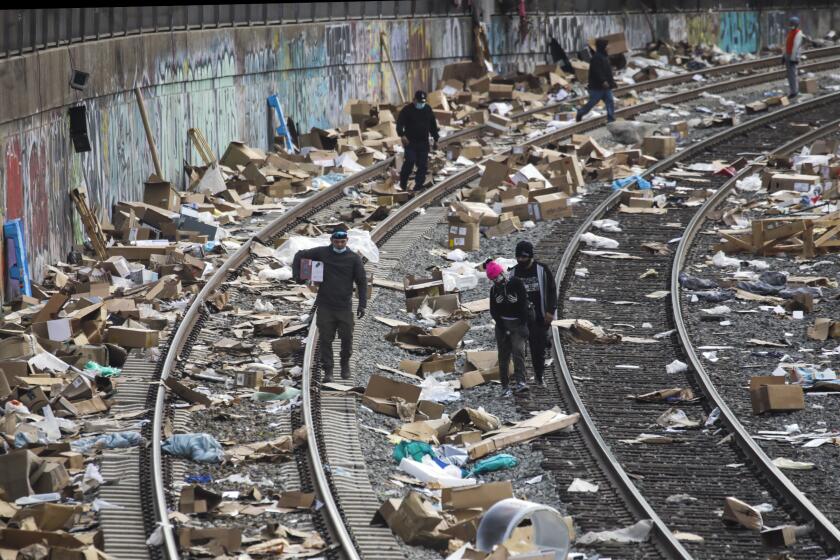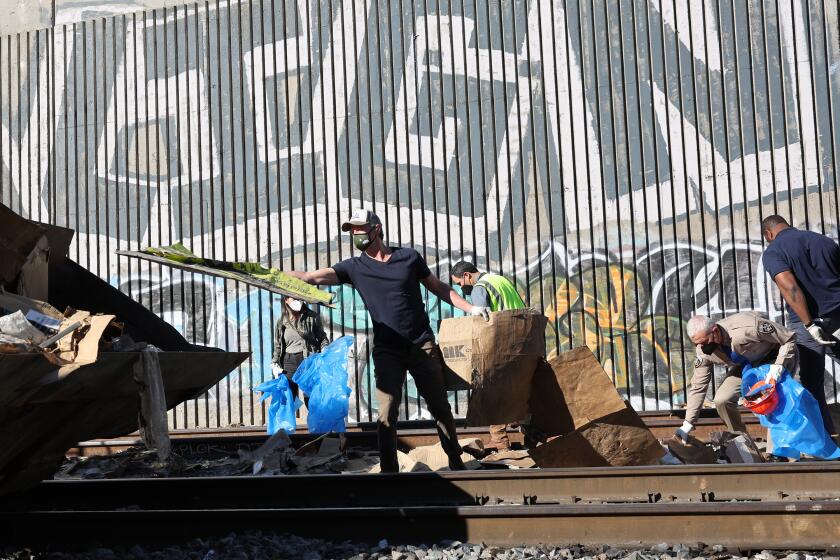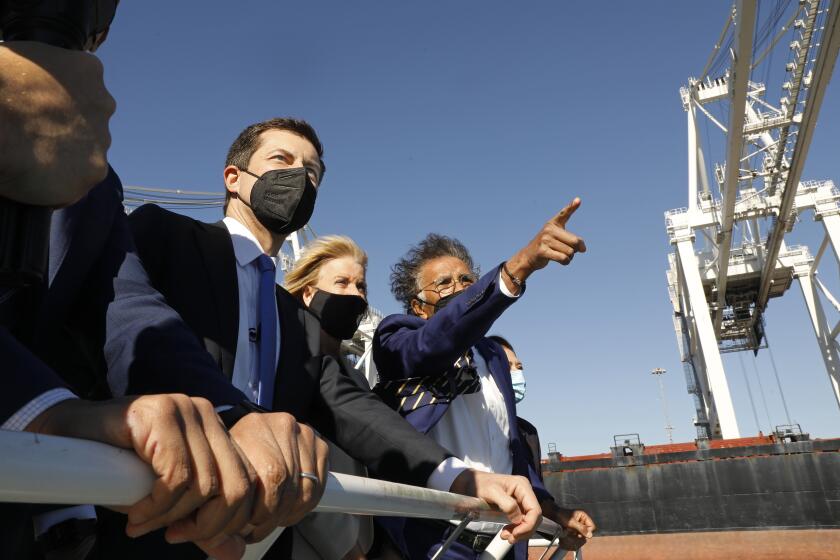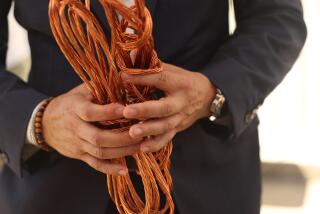‘Like a Third World country’: Gov. Newsom decries rail thefts amid push to beef up enforcement

The crush of cargo at the ports of L.A. and Long Beach, plus limited security on rail lines, helped make cargo trains vulnerable to theft, experts say.
The viral images were shocking: railroad tracks in the heart of Los Angeles buried in a blizzard of debris, as scavengers picked at what was left behind by thieves who broke into cargo containers on idle trains.
Last week’s thefts raised questions about how a key element of the supply chain could be so vulnerable. On Thursday, Gov. Gavin Newsom showed up to express his own confusion and outrage, even helping cleanup workers bag trash at the rail yard in Lincoln Heights.
“The images looked like a Third World country,” Newsom told reporters. “What you saw here in the last week is just not acceptable. So, I took off the suit and tie and said I’m coming because I couldn’t take it. I can’t turn on the news anymore. What the hell is going on?”
As Newsom, dressed in V-neck T-shirt and cargo pants, plucked the refuse, debris from packing peanuts, perfume boxes, individual Sriracha packs and 6-foot-long wooden planks lay scattered across a quarter-mile stretch of rail.
He appeared with Los Angeles County Supervisor Hilda Solis and members of the California Highway Patrol, Caltrans, Union Pacific Railroad and UPS.
For Newsom and many others, questions linger about how things got so bad along the railroad tracks, and what can be done about it.
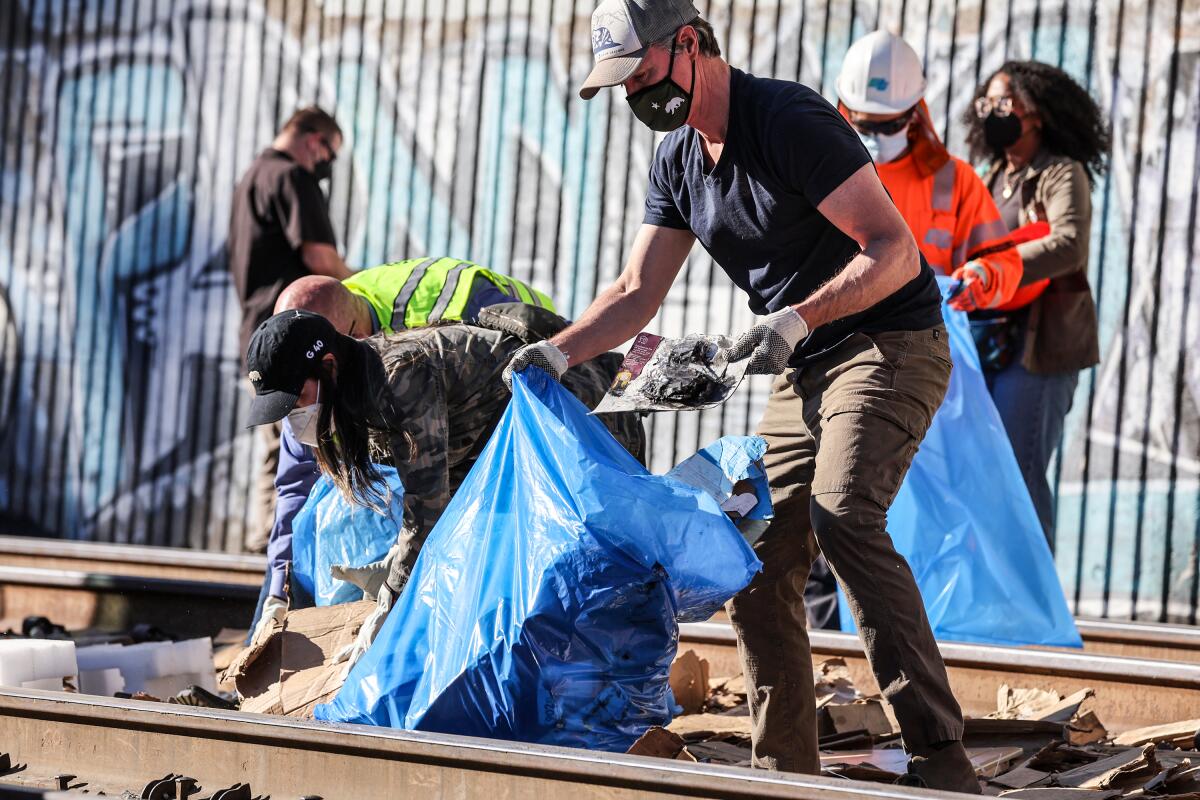
Experts pointed out that with Southern California a global hub for cargo in this e-commerce age, train cars filled with valuable goods are crisscrossing hundreds of miles of track at all hours. The supply chain congestion sometimes causes freight trains to sit idle, leaving them vulnerable to thieves in urban rail yards.
“A train at rest is a train at risk,” said Keith Lewis, vice president of operations for CargoNet, a company that tracks cargo thefts. “There’s a backlog of getting trains back to the West Coast from the East Coast. You got a lot of different supply chain issues.”
Under federal law, Union Pacific and other railroad companies can employ their own police force accredited by the state to protect tracks. Former employees and police say budgetary issues have slashed the ranks of the company’s force, leaving as few as half a dozen in the region. Union Pacific declined to say how many agents it has.
“Union Pacific from Yuma, Ariz., to L.A. has six people patrolling,” said Los Angeles Police Capt. German Hurtado, who works in the Hollenbeck station covering Lincoln Heights. “It is like digging sand at the beach. We set up a task force. We are making an arrest and then we see a quarter of a mile down the track someone else taking merchandise.”
Thieves pilfering railroad cars is a crime that harks back to the days of horseback-riding bandits, but is fueled by a host of modern realities including homeless encampments and e-commerce.
Union Pacific officials said they have been working with the LAPD, California Highway Patrol and the L.A. County Sheriff’s Department to combat the thefts. The company also deployed drones and is erecting fencing.
Newsom used the backdrop to pitch his proposed budget, which would grant $255 million to local law enforcement over three years and create a unit that would focus on retail, auto and train theft.
Robert Vega, who lives nearby, said the thefts started about seven months ago as the police presence ebbed. On Friday nights, he said, he regularly saw thieves prying open the hulking containers with tools to cut metal.
“You could see sparks flying,” he said. “I can come out at night and there are trucks loading up. It’s insane.”
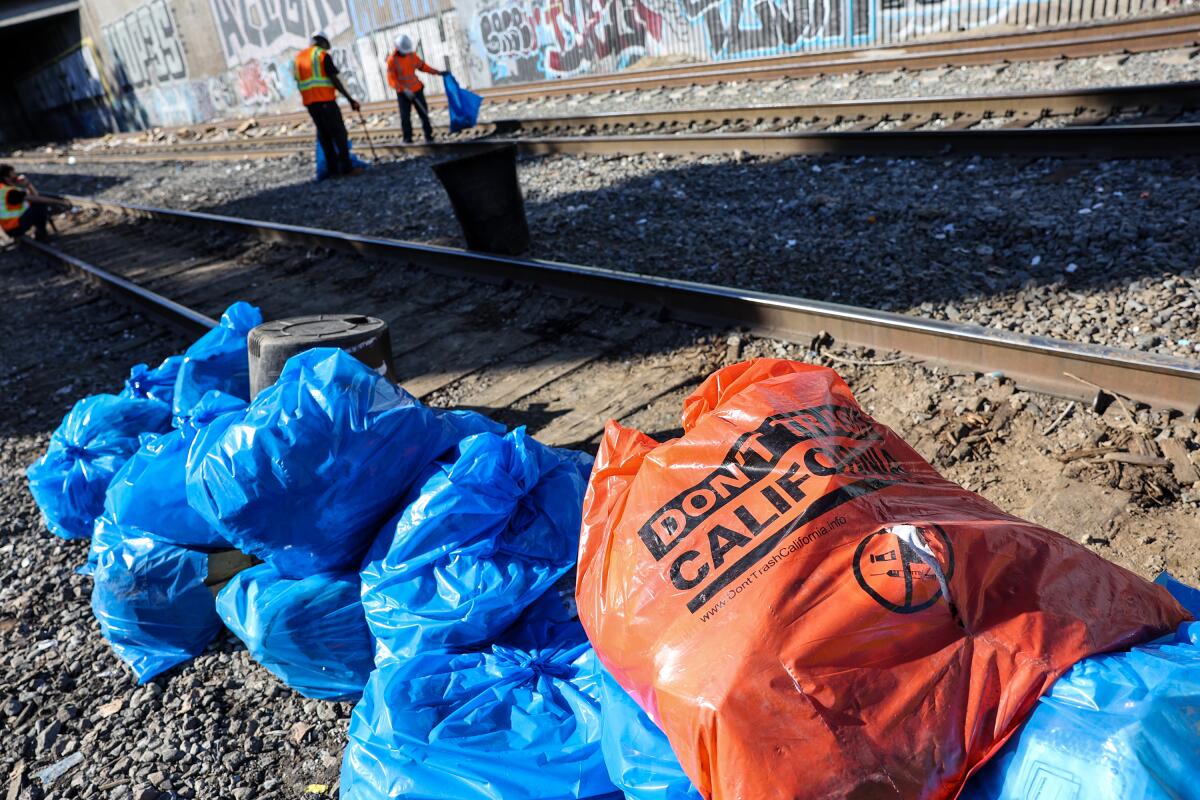
Vega began taking pictures and videos of the aftermath showing open container cars filled with Tesla boxes, pallets of Corona beer stacked up along the cars and even a fire nearby.
On Thursday, he watched as tractor-trailers scooped up the debris. “They are doing a cleanup today, but nothing is going to change unless they deal with train pirates.”
Between February and December of last year, 122 arrests were made along Union Pacific tracks by various agencies, according to LAPD data.
It’s still unclear how widespread the train thefts have been, with rail operators reporting a big increase in the last year.
Union Pacific has reported an alarming 160% increase since December 2020 in thefts along railroad tracks in L.A. County.
The break-ins provide a rare glimpse into a segment of America’s supply chain that relies on a private police system for security.
Union Pacific, based in Omaha and founded 160 years ago, oversees about 3,200 miles of railway in California. The publicly traded company is worth $155 billion and reported record profits on Thursday. It runs its own police force to protect the tracks where breaches occur. Last year a man and woman suspected of stealing beer pallets from a train in Fontana died fleeing police, and in the Coachella Valley deputies arrested a group of would-be thieves.
Union Pacific officials said the “unprecedented” rash of container break-ins in Los Angeles was unlike others they have seen. The company reported that thefts have jumped 160% since December 2020, with an average of 90 containers a day “compromised.”
The company would not release more specific data on rail burglaries or other crimes, though former employees said the ranks of officers have been slashed by more than half in recent years.
Union Pacific said most of the bandits target boxcars near two rail yards where cargo is transferred from trucks to trains, including the one in Lincoln Heights, occupying about 150 acres just east of downtown.
Much of the train traffic is connected to business generated at the ports of Los Angeles and Long Beach, where about 40% of the nation’s maritime imports enter the U.S. The yards are a key link in the supply chain for national retailers, warehouses and other distributors.
The other major railroad operator, BNSF, said it has not seen the same level of theft around its facilities.
Union Pacific said no type of cargo has been immune, and thieves are targeting both inbound and outbound trains. Scavengers last week said they found items including Louis Vuitton bags and robot parts.
Organized crime groups use other people to pilfer the cars, said Adrian Guerrero, a director of public affairs for Union Pacific. When UP changes its operations to prevent break-ins, he said, the thieves do too — and sometimes go out to the desert to evade security.
Last weekend, people visited the Lincoln Heights tracks to comb through the debris, hoping to make off with items left behind by the rail thieves.
Union Pacific said a derailment occurred Saturday at the same location where thieves pilfered cargo containers. Nobody was hurt and the Federal Railroad Administration is trying to determine the cause of the incident.
The Federal Railroad Administration has been in talks with Union Pacific and the California State Transportation Agency about recent criminal activity along the tracks in Los Angeles, said railroad administration spokesperson Warren Flatau.
“Cargo theft is a criminal matter, and UP has been working with law enforcement as well as identifying and taking appropriate actions to deter such acts. We are closely monitoring the situation to ensure safe operations,” he said.
During October, as suppliers were shipping out for the holiday season, Union Pacific reported that thefts surged 356% compared with the previous year at that time. The railway said criminals assaulted and carried out armed robberies of employees.
But legislators, law enforcement and former Union Pacific employees contend that the company does not provide enough officers, fencing and other protections to prevent crimes around its 275 miles of rail tracks in L.A. County.
At the Long Beach port, Transportation Secretary Pete Buttigieg praised local efforts to improve supply-chain issues. But a fresh challenge looms.
“It’s a long-standing effort by Hollenbeck to secure the site. Unfortunately, Union Pacific Railroad does little to secure or lock those trains,” said LAPD Deputy Chief Al Labrada, who oversees Central Bureau and worked as a Hollenbeck captain.
For its part, Union Pacific said that the county’s approach to low-level offenders has exacerbated the problem. “Charges are reduced to a misdemeanor or petty offense, and the criminal is released after paying a nominal fine,” Guerrero said in a letter to L.A. County Dist. Atty. George Gascón.
Alex Bastian, an advisor to Gascón, said the district attorney’s office had filed charges in some burglary and grand theft cases, but other cases don’t have enough evidence to prosecute. “Our office takes Union Pacific’s concerns seriously and hopes to discuss this issue more in the coming weeks,” Bastian said in an email.
Nick Vyas, an expert in supply chain management at USC, said he heard from executives in Europe and Asia asking him how these thefts could happen.
“It’s a blatant disregard for the law and I think exposes structural deficiencies in our supply chain,” he said. “The perception of our vulnerability is what concerns me the most.”
Times staff writer Irfan Khan contributed to this report.
More to Read
Sign up for Essential California
The most important California stories and recommendations in your inbox every morning.
You may occasionally receive promotional content from the Los Angeles Times.
